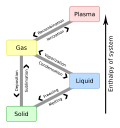Phase transition
Phase transition is a term used in physics to describe the transformation of a thermodynamic system from one phase or state of matter to another. A phase of a thermodynamic system and the states of matter have uniform physical properties. During a phase transition of a given medium, certain properties of the medium change, often discontinuously, as a result of the change of external conditions, such as temperature, pressure, or others. For example, a liquid may become gas upon heating to the boiling point, resulting in an abrupt change in volume.
Types of phase transitions[edit]
Phase transitions are classified into two broad categories, named after the Ehrenfest classification: first-order phase transitions and second-order phase transitions.
First-order phase transitions[edit]
First-order phase transitions are those that involve a latent heat. During such a transition, a system either absorbs or releases a fixed (and typically large) amount of energy. Because energy cannot be instantaneously transferred between the system and its environment, first-order transitions are associated with "mixed-phase regimes" in which some parts of the system have completed the transition and others have not. This phenomenon is familiar to anyone who has boiled water: the water does not instantly turn into gas, but forms a turbulent mixture of water and steam bubbles.
Second-order phase transitions[edit]
Second-order phase transitions are also called continuous phase transitions. They are characterized by a smooth and continuous change in the properties of the system, such as its specific heat capacity. Second-order phase transitions do not involve a latent heat: the changes occur smoothly and continuously from one phase to the other, with no energy being absorbed or released during the transition.
Examples of phase transitions[edit]
Some common examples of phase transitions include, but are not limited to, the melting of ice, the boiling of water, and the magnetization of a material in a magnetic field.
Melting of ice[edit]
The melting of ice is a first-order phase transition. When ice is heated, it absorbs heat energy that is used to break the hydrogen bonds between the water molecules. The heat absorbed is the latent heat of fusion. The temperature remains constant at 0°C until all the ice has melted.
Boiling of water[edit]
The boiling of water is another first-order phase transition. When water is heated to its boiling point, it absorbs heat energy to change from the liquid phase to the gas phase. The temperature remains constant at 100°C until all the water has vaporized.
Magnetization of a material[edit]
The magnetization of a material in a magnetic field is an example of a second-order phase transition. As the external magnetic field is increased, the magnetic moments of the atoms align with the field, causing the material to become magnetized. This transition is continuous and does not involve a latent heat.
See also[edit]
Ad. Transform your life with W8MD's Budget GLP-1 injections from $75


W8MD offers a medical weight loss program to lose weight in Philadelphia. Our physician-supervised medical weight loss provides:
- Weight loss injections in NYC (generic and brand names):
- Zepbound / Mounjaro, Wegovy / Ozempic, Saxenda
- Most insurances accepted or discounted self-pay rates. We will obtain insurance prior authorizations if needed.
- Generic GLP1 weight loss injections from $75 for the starting dose.
- Also offer prescription weight loss medications including Phentermine, Qsymia, Diethylpropion, Contrave etc.
NYC weight loss doctor appointmentsNYC weight loss doctor appointments
Start your NYC weight loss journey today at our NYC medical weight loss and Philadelphia medical weight loss clinics.
- Call 718-946-5500 to lose weight in NYC or for medical weight loss in Philadelphia 215-676-2334.
- Tags:NYC medical weight loss, Philadelphia lose weight Zepbound NYC, Budget GLP1 weight loss injections, Wegovy Philadelphia, Wegovy NYC, Philadelphia medical weight loss, Brookly weight loss and Wegovy NYC
|
WikiMD's Wellness Encyclopedia |
| Let Food Be Thy Medicine Medicine Thy Food - Hippocrates |
Medical Disclaimer: WikiMD is not a substitute for professional medical advice. The information on WikiMD is provided as an information resource only, may be incorrect, outdated or misleading, and is not to be used or relied on for any diagnostic or treatment purposes. Please consult your health care provider before making any healthcare decisions or for guidance about a specific medical condition. WikiMD expressly disclaims responsibility, and shall have no liability, for any damages, loss, injury, or liability whatsoever suffered as a result of your reliance on the information contained in this site. By visiting this site you agree to the foregoing terms and conditions, which may from time to time be changed or supplemented by WikiMD. If you do not agree to the foregoing terms and conditions, you should not enter or use this site. See full disclaimer.
Credits:Most images are courtesy of Wikimedia commons, and templates, categories Wikipedia, licensed under CC BY SA or similar.
Translate this page: - East Asian
中文,
日本,
한국어,
South Asian
हिन्दी,
தமிழ்,
తెలుగు,
Urdu,
ಕನ್ನಡ,
Southeast Asian
Indonesian,
Vietnamese,
Thai,
မြန်မာဘာသာ,
বাংলা
European
español,
Deutsch,
français,
Greek,
português do Brasil,
polski,
română,
русский,
Nederlands,
norsk,
svenska,
suomi,
Italian
Middle Eastern & African
عربى,
Turkish,
Persian,
Hebrew,
Afrikaans,
isiZulu,
Kiswahili,
Other
Bulgarian,
Hungarian,
Czech,
Swedish,
മലയാളം,
मराठी,
ਪੰਜਾਬੀ,
ગુજરાતી,
Portuguese,
Ukrainian





